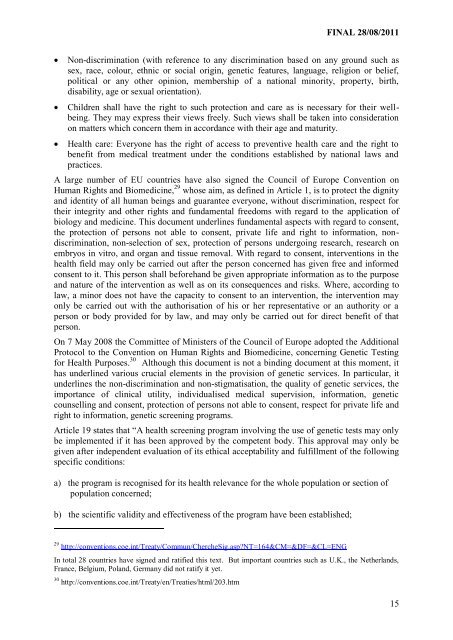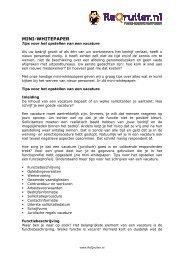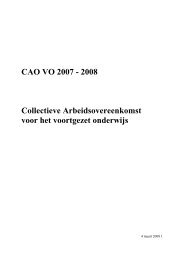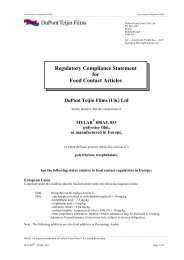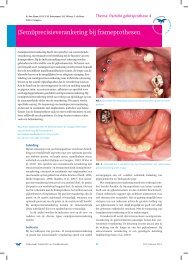Newborn screening in Europe Expert Opinion document
Newborn screening in Europe Expert Opinion document
Newborn screening in Europe Expert Opinion document
You also want an ePaper? Increase the reach of your titles
YUMPU automatically turns print PDFs into web optimized ePapers that Google loves.
FINAL 28/08/2011Non-discrim<strong>in</strong>ation (with reference to any discrim<strong>in</strong>ation based on any ground such assex, race, colour, ethnic or social orig<strong>in</strong>, genetic features, language, religion or belief,political or any other op<strong>in</strong>ion, membership of a national m<strong>in</strong>ority, property, birth,disability, age or sexual orientation).Children shall have the right to such protection and care as is necessary for their wellbe<strong>in</strong>g.They may express their views freely. Such views shall be taken <strong>in</strong>to considerationon matters which concern them <strong>in</strong> accordance with their age and maturity.Health care: Everyone has the right of access to preventive health care and the right tobenefit from medical treatment under the conditions established by national laws andpractices.A large number of EU countries have also signed the Council of <strong>Europe</strong> Convention onHuman Rights and Biomedic<strong>in</strong>e, 29 whose aim, as def<strong>in</strong>ed <strong>in</strong> Article 1, is to protect the dignityand identity of all human be<strong>in</strong>gs and guarantee everyone, without discrim<strong>in</strong>ation, respect fortheir <strong>in</strong>tegrity and other rights and fundamental freedoms with regard to the application ofbiology and medic<strong>in</strong>e. This <strong>document</strong> underl<strong>in</strong>es fundamental aspects with regard to consent,the protection of persons not able to consent, private life and right to <strong>in</strong>formation, nondiscrim<strong>in</strong>ation,non-selection of sex, protection of persons undergo<strong>in</strong>g research, research onembryos <strong>in</strong> vitro, and organ and tissue removal. With regard to consent, <strong>in</strong>terventions <strong>in</strong> thehealth field may only be carried out after the person concerned has given free and <strong>in</strong>formedconsent to it. This person shall beforehand be given appropriate <strong>in</strong>formation as to the purposeand nature of the <strong>in</strong>tervention as well as on its consequences and risks. Where, accord<strong>in</strong>g tolaw, a m<strong>in</strong>or does not have the capacity to consent to an <strong>in</strong>tervention, the <strong>in</strong>tervention mayonly be carried out with the authorisation of his or her representative or an authority or aperson or body provided for by law, and may only be carried out for direct benefit of thatperson.On 7 May 2008 the Committee of M<strong>in</strong>isters of the Council of <strong>Europe</strong> adopted the AdditionalProtocol to the Convention on Human Rights and Biomedic<strong>in</strong>e, concern<strong>in</strong>g Genetic Test<strong>in</strong>gfor Health Purposes. 30 Although this <strong>document</strong> is not a b<strong>in</strong>d<strong>in</strong>g <strong>document</strong> at this moment, ithas underl<strong>in</strong>ed various crucial elements <strong>in</strong> the provision of genetic services. In particular, itunderl<strong>in</strong>es the non-discrim<strong>in</strong>ation and non-stigmatisation, the quality of genetic services, theimportance of cl<strong>in</strong>ical utility, <strong>in</strong>dividualised medical supervision, <strong>in</strong>formation, geneticcounsell<strong>in</strong>g and consent, protection of persons not able to consent, respect for private life andright to <strong>in</strong>formation, genetic <strong>screen<strong>in</strong>g</strong> programs.Article 19 states that “A health <strong>screen<strong>in</strong>g</strong> program <strong>in</strong>volv<strong>in</strong>g the use of genetic tests may onlybe implemented if it has been approved by the competent body. This approval may only begiven after <strong>in</strong>dependent evaluation of its ethical acceptability and fulfillment of the follow<strong>in</strong>gspecific conditions:a) the program is recognised for its health relevance for the whole population or section ofpopulation concerned;b) the scientific validity and effectiveness of the program have been established;29 http://conventions.coe.<strong>in</strong>t/Treaty/Commun/ChercheSig.asp?NT=164&CM=&DF=&CL=ENGIn total 28 countries have signed and ratified this text. But important countries such as U.K., the Netherlands,France, Belgium, Poland, Germany did not ratify it yet.30 http://conventions.coe.<strong>in</strong>t/Treaty/en/Treaties/html/203.htm15


